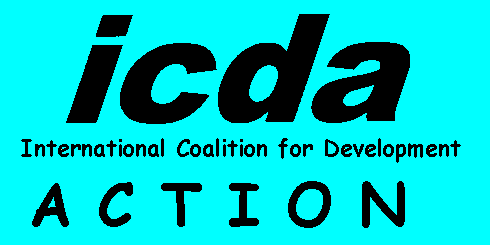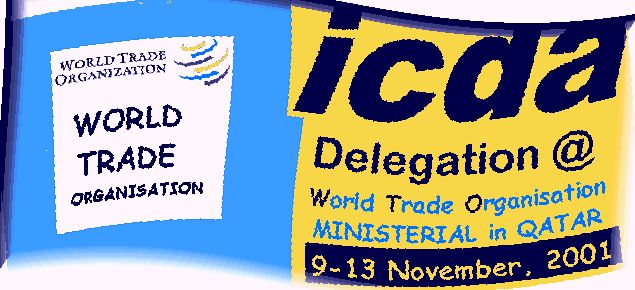
This site is best viewed with
| ICDA LATEST |
ICDA Latest News
Programme areas
ICDA History
| ICDA MEMBERS |
Current Members
| WTO IMPACT LIST |
Subscribe Here
What do you think?
| CENNT |
Latest News
IWGGT (in construction)
| PUBLICATIONS |
Latest ICDA Journal (in construction)
Latest ICDA Update (in construction)
| VACANCIES |
Internship
Book Keeper/Part time administrative Assistant
| HELP |
FAQ's
About Us
Contact Us

| BACKGROUND >> LIBERALISATION? DON'T REJECT IT JUST YET |
| By:Mike Moore |
Monday February 26, 2001
A monstrous plot is afoot. Public schools and hospitals are under threat. So is the right of governments to set standards that protect our health and environment. The World Trade Organisation is trying to resurrect the ill-fated Multilateral Agreement on Investment, or MAI. It must be stopped before it is too late.
WTO critics have always taken liberties with the truth. But the lies and distortions they are peddling about the WTO's services agreement, Gats, are astounding.
Freeing up trade in commercial services - everything from telecoms and tourism to finance and freight transport - offers huge benefits for every part of the world.
That is why the WTO's 140 member governments are negotiating further services liberalisation in Geneva. Those talks, and the WTO's existing services agreement, do not threaten governments' ability to provide public services, their right to regulate, or their scope to impose restrictions on foreign investment.
Commercial services account for three fifths of the world economy but only a fifth of world trade.
Clearly, there is huge scope to expand services trade. Just as liberalising trade in goods has boosted economic growth over the past 50 years, so liberalising trade in services could bring huge benefits over the next 50.
Allowing foreign suppliers to compete with domestic ones lowers prices, improves quality and increases choice.
For developing countries it also means access to vital tech nology and capital investment in underdeveloped infrastructure. An efficient service sector is also the backbone of a successful economy: without efficient finance, telecoms and transport, a country cannot competitively produce textiles, tomatoes or whatever.
An added bonus of liberalising at the WTO is that governments can credibly commit to keep their markets open. That provides stability and predictability for business, which encourages trade and investment and means more jobs and more tax revenue for participating governments.
Gats is an incredibly flexible agreement. It spells out a few general obligations, notably that countries must not discriminate between foreign suppliers. But otherwise, governments have huge scope to choose the areas to which they want to commit themselves.
They can choose which sectors they want to agree to open up to foreigners - and in the sectors in which they choose to make commitments, governments can set limits on how far they want to open their markets to foreigners and the extent to which they want to treat foreign suppliers like domestic ones.
For instance, they might allow cross-border software trade, but prevent a foreign software company from setting up shop in their domestic market. Or they might encourage tourists to visit, but prevent foreign tourist guides from coming to work. Last, governments can even request exemptions, which in principle would be limited to 10 years, to their general obligation not to discriminate between foreign suppliers.
This is hardly an MAI mark II by the back door.
The ill-fated MAI was an agreement on foreign investment. Governments can, if they want, use Gats to attract inward funding by guaranteeing to potential investors that they will not suddenly change the rules of the game.
But multinationals or other service suppliers cannot simply go into any WTO member country and buy anything and everything. Member governments decide which services foreigners are allowed to provide and under which conditions. Nothing stops governments from favouring domestic suppliers of a service over foreign ones if they want to.
Of course, most governments now welcome foreign investment with open arms rather than trying to protect themselves from it.
It is the lack of investment that is the problem for many countries: Singapore gets more investment than the whole of Africa. It is also nonsense that Gats undermines governments' ability to set standards to protect the public or the environment. The right to regulate the supply of services is one of the basic principles. Foreign suppliers have to comply with all domestic regulations; the rules do not have to be modified for their benefit.
Liberalisation means allowing foreign suppliers to compete - it does not imply deregulation. Moreover, governments can take any measures necessary to protect human, animal or plant life or health, so long as they do not constitute unjustifiable discrimination or disguised protectionism. This overrides any other provision in Gats.
Perhaps the most damaging claim is that Gats threatens governments' ability to provide the public services that we all cherish, such as schools and hospitals. Gats, it is said, will force governments to privatise public services and open them up to foreign competition.
That is just not true. Gats explicitly excludes services supplied by governments. True, governments can agree to allow foreign suppliers to provide private healthcare or education.
But that is not the same as privatising public services. Nor does that imply compromising standards - governments can enforce the same standards on foreign suppliers as on nationals. They can even impose additional requirements on foreigners if they wish.
Lopping a third off barriers to trade in services would add $390bn to the world economy, according to a study by Robert Stern of the university of Michigan. That means more jobs, higher living standards and more for governments to spend. It is too big a prize to let slip because of misplaced fears about the WTO's services talks.
• Mike Moore is director general of the World Trade Organisation
Guardian Unlimited © Guardian Newspapers Limited 2001
Please click here to go back to WTOMC Page
Copyright ©E.K.BENSAH II PRODUCTIONS. 1998-2001